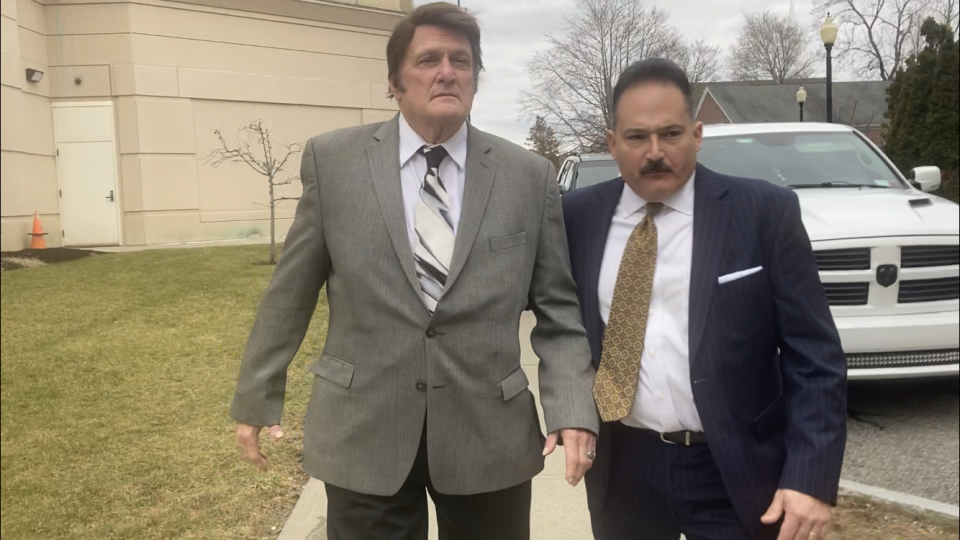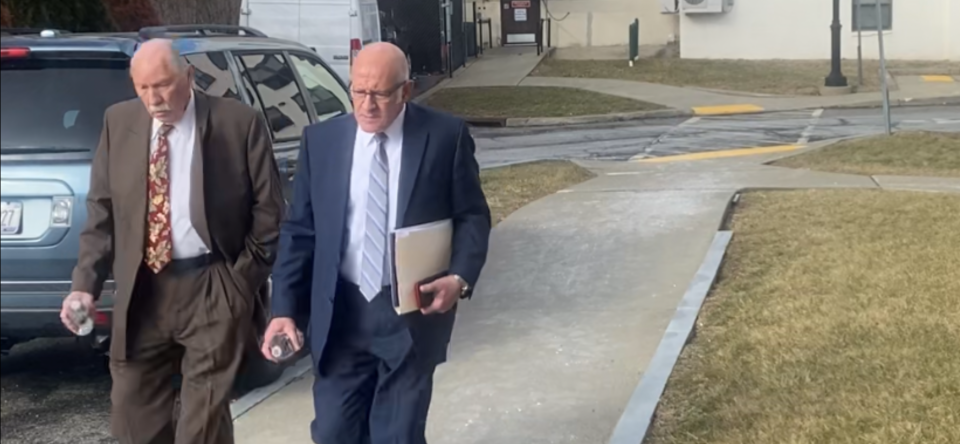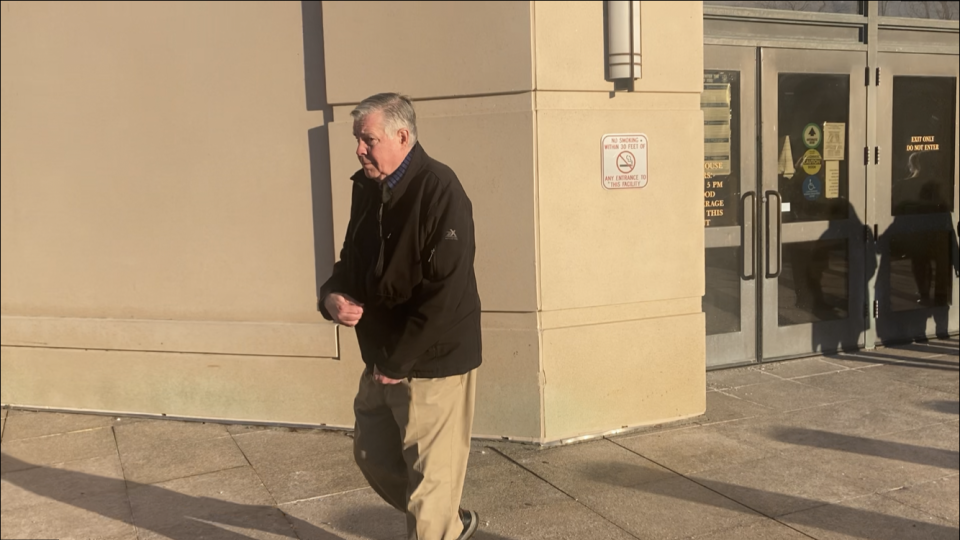Defense assails Putnam investigators in Krivak retrial. Here's what to know
- Oops!Something went wrong.Please try again later.
When Andrew Krivak and Anthony DiPippo were arrested July 1, 1996, in the rape and murder of 12-year-old Josette Wright, Putnam sheriff's investigators knew they couldn't interview DiPippo because he had a pending criminal case.
But the 18-year-old Krivak was fair game. And the eight hours they spent with him that day, culminating in a purported confession, would come to define his case and land him in prison for nearly a quarter of a century.
Now as Krivak is on trial again after his conviction was overturned in 2019, the investigators, long retired, were back on the witness stand. Patrick Castaldo and William Quick detailed for prosecutors a by-the-book interrogation and Daniel Stephens stood by the lie detector test that turned Krivak’s denials into admissions.
But on cross examination by Krivak’s lawyer, Oscar Michelen, they were confronted with unlikely similarities in statements, recantations by key witnesses and a failure to record with audio or video anything Krivak said that day. And Stephens had to explain something he wasn’t confronted with in the 1997 trial: how an earlier polygraph exam led to a false confession that sent a teenager to prison for 16 years for a murder he didn’t commit.

Trial starts:Krivak retrial begins in 1997 murder of 12-year-old Putnam girl
Rant: Witness outburst briefly disrupts Krivak trial. This is what she told jurors
There was no confession in DiPippo’s case, but he was also convicted of second-degree murder at a separate trial in 1997. He had that conviction overturned in 2010, was convicted the following year, and again had it tossed out. At a third trial in 2016 he was acquitted and settled a federal wrongful conviction lawsuit against Putnam County for $12 million.
Krivak's defense is centered on attacking his statement to police and making the case that a sex offender named Howard Gombert was Josette's killer. The prosecution rested its case on Tuesday.

Who are Castaldo and Quick?
Castaldo had been assigned the missing person case when Josette disappeared from Carmel in October 1994. After her skeletal remains were discovered in the woods off Fields Lane in Patterson on Nov. 22, 1995, he was tapped as lead investigator, with Quick his partner. Neither had ever investigated a homicide before.
Their work fell into a pattern. Castaldo asked most of the questions; Quick took notes and wrote down statements.
Neither paid much attention to Gombert, who knew Josette and had been seen with her in a car a few days before she disappeared. Other investigators had been tasked with looking into Gombert, but Castaldo testified that the car was searched and nothing turned up.
Castaldo and Quick denied feeding details of the crime to Denise Rose, the main prosecution witness who claims to have been in a van with DiPippo and Krivak on the night of Oct. 3, 1994, when they tied up and gagged Josette, raped her and dumped her in the woods. They also insisted they never threatened her with prosecution if she didn’t go along with their theory of the case.
Castaldo has backtracked somewhat from his yearslong insistence that what Quick wrote in the statement was verbatim what Krivak said. But Quick repeatedly testified that if he wrote down the words, the person they were interviewing said them.

Quick said he couldn't remember many details from the case or even all the things he said four years ago during a deposition in DiPippo's civil suit. But he told Michelen he hadn't felt the need to review his prior testimony.
"I really don't want to deal with this anymore. This has bothered me a lot," he said.
"Where on the list of people who have been bothered do you sit?" Michelen responded.
Judge Robert Prisco sustained District Attorney Robert Tendy's objection.
The investigators' actions
The investigators had Rose’s statement by the end of April 1996 and got another one the next month from Adam Wilson, who Rose said was also in the van at the time of the killing. But Wilson quickly recanted. A car was later wired for an acquaintance to try to get Wilson to unrecant. And while Castaldo insisted that was done by the ID unit, a video played for the jury showed Quick at the car with the narcotics investigator who wired it.
On July 1, 1996, Castaldo and Quick picked Krivak up in Beacon and brought him to the sheriff's department. He spent more than an hour denying any involvement in the killing, then offered to take a lie detector test. That's the only thing the defense concedes, what his lawyer Karen Newirth said in opening statements was the worst decision he ever made.

Stephens was notified and spent more than three hours with Krivak. First he prepped him and got him to sign a consent form. Then he administered the test, during which Krivak continued his denials. Afterwards, Stephens told him he had lied.
"I said: 'this instrument is a cold-hearted instrument. It can't speak for you. It can't draw me a pictureas to why Josette Wright was killed. Only you can,'" Stephens told prosecutor Larry Glasser. "And he kind of bowed his head, and I said, 'You're going to have to tell the truth,' and he looked up and he said, 'Would itmake a difference if it was done by accident and not on purpose?"
Stephens acknowledged that even before Krivak used the word "accident" he had introduced it to Krivak when he said the machine could not tell if someone had done something unintentionally.
On cross examination, Stephens conceded that was a technique — along with telling a suspect that they had failed the test — to get them to try to minimize the crime and seek a way out.
"You knew it would have the effect of psychologically saying 'OK, a door has now opened?" Michelen asked.
"Yes."
Prisco reminded jurors on at least two occasions that the results of lie detector tests are unreliable and inadmissible in court and cannot be used to determine whether a defendant is guilty. But he said that the testimony was offered strictly for them to determine whether the alleged confession was made voluntarily.
'Get the Confession'
When Krivak was brought back to Castaldo and Quick, they claim he asked if rape was less than murder and then dictated the 6-page statement admitting the rape but saying it was DiPippo who killed Josette. The investigators denied they had fed Krivak any of the details from Rose's statement so that his would corroborate hers.
Quick claimed video recording statements was not as common as it is now. He gave a few reasons why it might not have been done that day, either that it took too much time to set up or the video machine might not have been working. He suggested the sheriff's office only had one and he remembered it as cumbersome.
When Michelen asked him why he simply hadn't taken out a tape recorder to at least get audio, Quick told him he never had "good experience with audio recordings."
Stephens acknowledged the mantra that defined his role that day and on many others: “GTC, or Get the Confession.” A member of a politically-connected Putnam family, he joined the sheriff’s department at 21 and worked his way up to senior investigator. And he was the department’s polygraph examiner, with his own room in the investigations bureau he called the polygraph suite. He estimated conducting between 8,000 and 10,000 lie detector tests, about half of them in criminal cases. Many of those he did as part of a private business he operated out of an office in Brewster.
It was in that capacity that Peekskill detectives turned to Stephens on Jan. 25, 1990, to administer a lie detector test to a teenager they suspected of raping and killing a 15-year-old girl. Stephens let Jeffrey Deskovic know he had failed and turned him back over to the detectives. But he also secured a key detail that would help the Westchester prosecutor overcome the fact that DNA found in semen on the victim did not match Deskovic. He claimed that Deskovic suggested that maybe the killer had not ejaculated.
Deskovic claimed he never used that word. He was exonerated and freed from prison in 2006 after DNA testing identified the real killer.
Jurors at Krivak’s first trial knew nothing about the Deskovic case or Stephens’ role in it. But he was confronted last week not only about the polygraph test and its aftermath but also the result of Deskovic’s federal lawsuit against Stephens and Putnam County.
Stephens acknowledged being found liable for fabricating evidence and coercing a false confession from Deskovic. But he denied the allegations, insisting he had simply conducted his polygraph and turned the teenager over to the detectives who took his confession. He did see Deskovic curled up on the floor crying after he was finished, the lead investigator patting the boy’s back. But he did not intervene to see if he was ok. Why would he? he suggested. It was their case.
Stephens stood by his handling of Krivak, saying his demeanor that day was the same as it was now on the witness stand. Michelen called it his Mr. Rogers demeanor, and suggested he had actually been physically coercive and confrontational with Krivak that day, which Stephens denied.
Stephens' work wasn't totally finished when he turned Krivak back over to Castaldo and Quick. He testified about the "post-confession statement" he took from Krivak, a series of questions to back up what Krivak purportedly told the investigators, with Quick writing the questions and the answers. Glasser had him read them.
One of the last was "Now that you have told me the truth, how do you feel?"
Krivak's answer, he wrote: "Like sh**, I just feel like sh**."
Michelen later suggested that "feel like sh**" might have referred to how Krivak felt about admitting to something he hadn't done.
"Is it fair to say your GTC was completed at that point?" he asked.
Stephens said it was.
This article originally appeared on Rockland/Westchester Journal News: Putnam investigators defend handling of Josette Wright murder case

